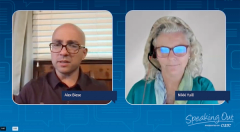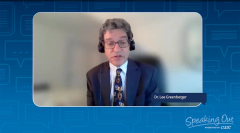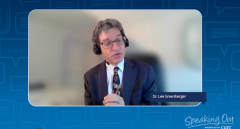
Patients with leukemia and lymphoma face racial disparities, financial toxicity, treatment side effects
As part of its Speaking Out video series, CURE spoke with Nikki Yuill, oncology social worker and director of the Leukemia & Lymphoma Society’s Information Resource Center, about some of the challenges faced by patients.
Episodes in this series

Transcription:
Alex Biese: Hi, my name is Alex Biese. I'm the assistant managing editor of CURE magazine. In this edition of the Speaking Out video series, on behalf of Leukemia & Lymphoma Society. I'm speaking with oncology social worker and director of LLS' Information Resource Center Nikki Yuill about some of the challenges faced by patients. Nikki, thank you so much for taking some time to talk today.
Nikki Yuill: Oh, you're very welcome. It's a pleasure to be here.
Biese: So what are some of the current disparities experienced by different populations of patients with leukemia and lymphoma?
Yuill: First of all, at the Leukemia & Lymphoma Society we are dedicated to ensuring that all blood cancer patients and survivors have access to the care that they need when they need it. But as you well know, for many patients, this just doesn't happen. The disparities faced by blood cancer patients are very similar to the disparities faced in general in the United States. We know that minority groups are disproportionately impacted by disparities, and this is across different blood cancer diseases, including having a higher incident rate. These disparities often result in higher death rates and increased cost of care. So, I can give you an example, such as that Black Americans have at least double the incidence of myeloma compared to any other race or ethnicity. And recent studies show they have additional barriers and lower access to care. As advocates for health equity (at) the Leukemia & Lymphoma Society, we are determined to erase these disparities, we really do believe that every patient deserves the best care and support possible. And through our Myeloma Link program we're really trying to empower Black communities through educational outreach and enhanced access to care.
Biese:Thank you for pointing all that out. And that sounds like a really important program, increasing access to care. What are some of the current challenges patients face relating to specifically adhering to a treatment plan that's established by them and their care team?
Yuill: Yeah, so adherence is a is a big issue. I would tell you in my practice, and in what we hear at LLS, for adherence (it) is really about cost and financial toxicity. So, patients being able to afford the cost of treatment, the cost of travel to get to their locations, cost of insurance, monthly insurance premiums, being able to afford housing and electricity and all of the other household expenses while still trying to work and also be able to adhere to their treatments. So again, overall, these financial stressors can greatly impact someone's ability to adhere to the best treatment plan.
The other point is that the pandemic. We know that COVID-19 made this financial toxicity even worse for many of our patients, including seeing an increase in food insecurity and unsecure housing. So all of these financial factors can impact adherence to the treatment plan.
The other bucket that I think relates to adherence is side effect management and toxicity management, and how this relates to one's quality of life. This is a really important factor. If you feel terrible every time you take this amazing pill that's keeping you in remission or curing you, it's really hard to convince patients to keep taking that medication. So I think effective side effect management is really important.
And then, the third area would be mental health, just addressing the high rates of anxiety and depression, and how these factors might contribute to folks having a difficult time adhering to their treatment plan and having a successful outcome.
Biese: And on one of those topics, side effect management and toxicity management, say a patient is dealing with some side effects and some toxicity that is very difficult. What sorts of conversations should they be having with their doctor, in terms of management in terms of continuing to adhere to the treatment plan?
Yuill: Absolutely. So this is where trusting and open communication is so important with your doctor and the treatment team. We think about shared decision making as a great model to reference here where patients' goals and patients' values, including what they expect as their quality of life, are communicated directly and frequently with their health care provider so that they're working together as a team to empower patients, to address these quality of life issues throughout every part of their treatment, because we know if those side effects can be managed aggressively early on that it's much more likely that patients will adhere and have successful outcomes.
Biese: Got it. Well, Nikki, thank you so much for your insight on this topic. It is incredibly, appreciated. Thank you again.
Yuill: You're very welcome.
Transcription edited for clarity and conciseness.
For more news on cancer updates, research and education, don’t forget to








